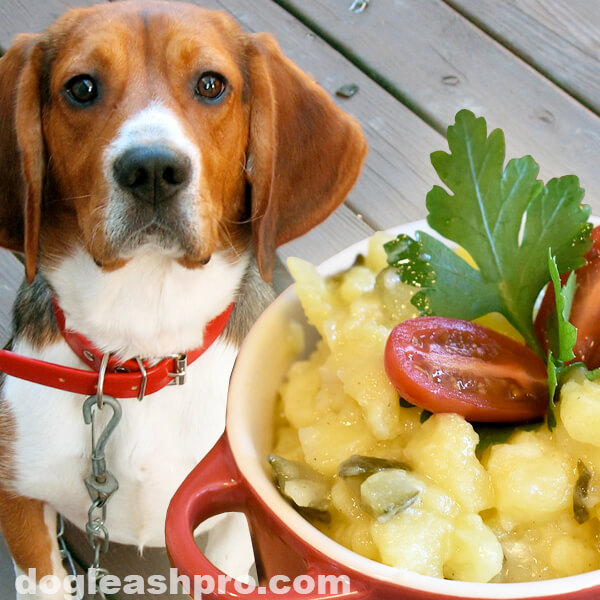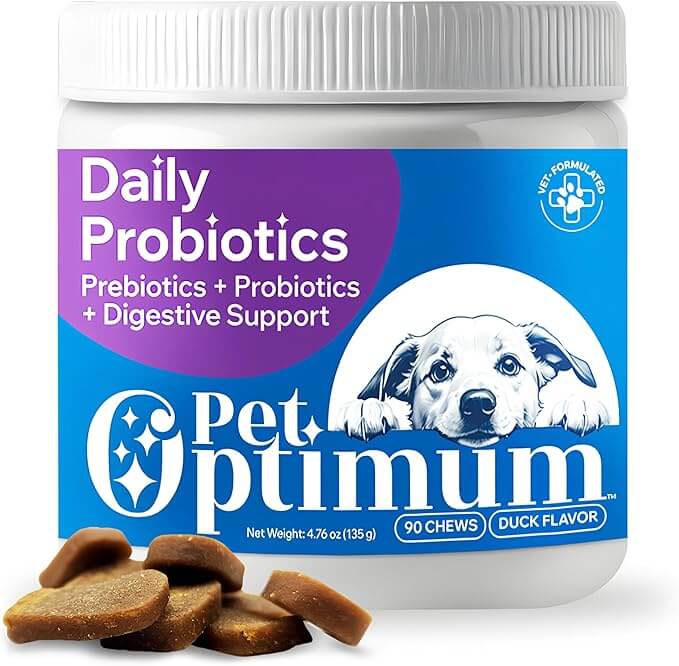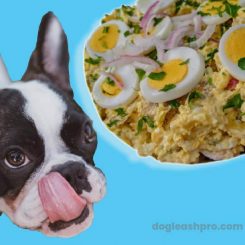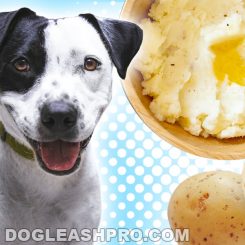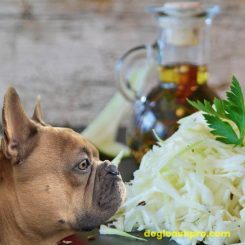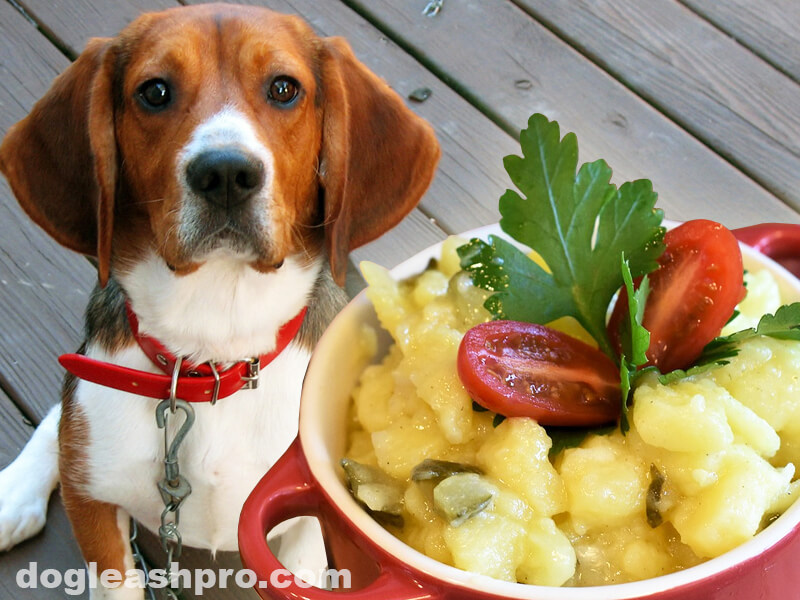
This past Memorial Day weekend, we had grilled chicken, shrimp, and fish with Potato salad as the side dish (my family was getting tired of the annual Egg Salad side dish). My two pups stayed near the table where the food was and they were drooling! I felt bad and wanted to feed them some Potato salad but wondered if this dish is safe for dogs to eat.
Can dogs eat Potato salad? Yes, dogs can eat Potato salad, but in moderation. Potato salad and other potato derivatives are not the ideal food for your canine buddy. In addition, some ingredients in Potato salad can be toxic to dogs.
Table of Contents
Can dogs have Potato salad?
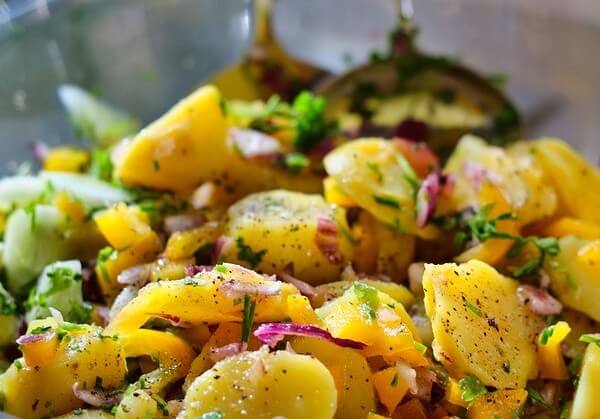
You shouldn’t let your furry friends have Potato salad if it contains any toxic ingredients. Even if it doesn’t, Potato salad isn’t the healthiest for our canine companions and it is not something your pups can have regularly.
What is Potato salad?
It’s a popular side dish made with boiled potatoes and several other ingredients.
What is in Potato salad?
Other than boiled potatoes, Potato salad usually contains a combination of ingredients like mustard, mayonnaise, boiled eggs, celery, onion, vinegar, herbs, bacon, and seasoning. Some of these ingredients in Potato salad are toxic to dogs, which is why your pooch should stay away from this side dish.
Where does Potato salad come from?
Potato salad is a beloved side dish that you can put together at home or buy ready-made from the store.
How is it made?
Potato salad is made with chunks of skinless boiled potatoes mixed with mayonnaise or a mayo substitute (yogurt or sour cream), together with mustard, salt, pepper, herbs, and other seasonings. Some people also add hard-boiled eggs or bacon. The salad is usually served cold.
Is leftover Potato salad safe for dogs?
The safety of leftover Potato salad largely depends on the ingredients used. If you’ve made Potato salad for people, it likely contains several flavor enhancers. Such components, while safe for people, may not be suitable for your furry buddy.
Let’s look at some common ingredients found in Potato salad and how they may affect your four-legged friend.
Boiled potatoes are not healthy for dogs
Some pet owners love feeding potatoes to their pups. However, potatoes (whether raw or boiled) are not perfectly safe for canine consumption. For instance, raw potatoes contain a toxic substance called solanine. Peeling and cooking the potato destroys most of its toxicity, but the risk is still there.
Potatoes are also loaded with carbs which may not suit most dogs. Unless your furry friends have a very active lifestyle, these carbs will turn into fats and contribute to their weight.
Potatoes have also been linked with canine dilated cardiomyopathy (DCM). This condition severely impedes the dogs’ heart function by inflating their cardiac muscles.
Dogs who eat potatoes regularly may experience the following:
- Obesity.
- Diabetes.
- Digestive issues.
- Heart problems.
- Higher chance of cancer.
- Potato poisoning.
Boiled eggs are healthy and safe for dogs to eat
Eggs are healthy, nutritious, and perfectly safe for dogs. They carry a ton of protein, vitamins, minerals, and amino acids essential for the canine body. Also, they’re easily digestible, wholesome, and dense with energy. Although dogs can eat all kinds of eggs, it’s best not to give them raw eggs.
Mayonnaise is unhealthy for dogs
Mayonnaise doesn’t contain any toxic ingredients. Nevertheless, it’s unhealthy for dogs if eaten regularly. Excessive consumption of this condiment can cause:
- Gastrointestinal distress.
- Canine obesity.
- Cardiac problems.
- Diabetes.
- Pancreatitis.
Onion is toxic to dogs
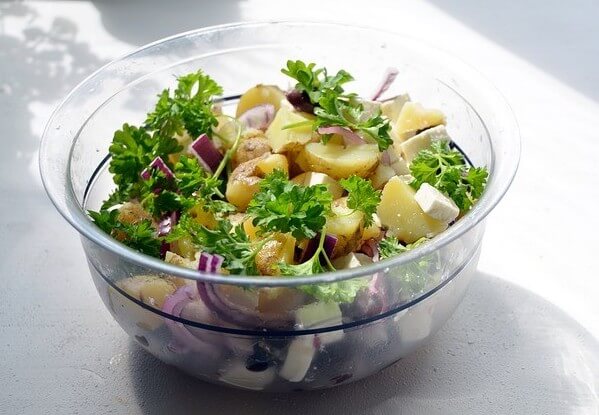
Onions are one of the most toxic foods for dogs and must never be present in anything you feed your furry friend. Whether cooked or uncooked, onions can poison dogs and cause severe health complications, such as:
- Weakness.
- Stomach distress.
- Dermatitis.
- Anemia (destruction of red blood cells).
- Asthma.
- Liver damage.
Dairy products are harmful to dogs that are lactose intolerant
Potato salad is often enriched with dairy products like cream, Sour Cream, and cheese. These ingredients are not only high in fats but also contain lactose: a substance most dogs are intolerant to. Overeating dairy products can cause the following in dogs:
- Bloating.
- Dehydration.
- Lethargy.
- Vomiting.
- Stomachache.
- Diarrhea.
- Gas.
Bacon is unhealthy for dogs
While you might think dogs can eat all sorts of meat safely, that’s not the case. Processed meat (like bacon) is high in sodium and fats, making it unhealthy for dogs in large quantities. The combined effect of mayonnaise, cream, cheese, and bacon makes Potato salad a very fattening snack for dogs.
Eating fatty foods in excess can lead to the following in canines:
- Lethargy.
- Obesity.
- Heart disease.
- Digestion problems.
- Diabetes.
- Pancreatitis.
When shouldn’t you feed Potato salad to your dog?
Our furry friends shouldn’t eat Potato salad that isn’t meant for them, meaning dog owners should avoid giving them leftover Potato salad. Ingredients added to enhance flavor can have unwanted effects on dogs. Especially if the ingredient is onion.
If your pooch is old, overweight, or diabetic, Potato salad isn’t the right food for them. It is high in fats, carbs, and seasonings which may be difficult for dogs to digest. Also, dogs with a weak immune system or dogs that are battling cancer should also avoid starchy carbs. For such dogs, it’s best to stick with regular dog foods.
Does Potato salad provide nutritional benefits for your dog?
Other than being rich in carbohydrates, potatoes also provide several other nutrients and benefits for the dog’s body, like:
- Vitamin C: An antioxidant that helps detoxify the dog’s body and improve immunity.
- Vitamin B6: Essential for kidney function, bladder health, and utilizing amino acids.
- Potassium: Helps keep the energy level up.
- Magnesium: Helps with muscle function.
- Iron: An essential dietary mineral that makes blood healthier.
- Fiber: Helps keep the digestive system clean.
While all these nutrients are necessary for dogs, they can get them through safer, healthier food sources that is canine-friendly and non-toxic.
What if my dog accidentally ate Potato salad?
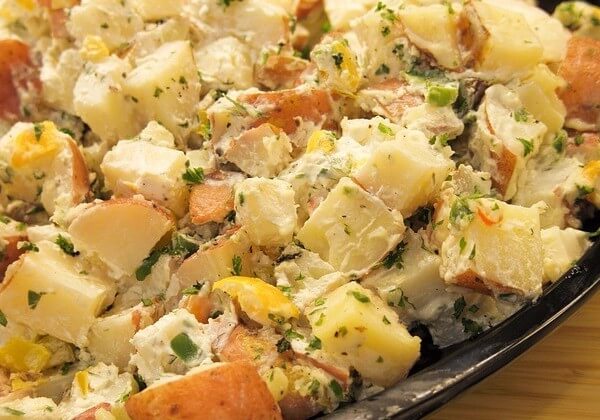
If your pooch happens to lick a little Potato salad, there is no need to worry. Even if any toxins or allergen, such as onion or dairy, are present in the Potato salad, a tiny amount won’t harm your canine buddy.
However, you may need to check the ingredients if your pups have feasted on a whole plate of leftover Potato salad. If they have onion or garlic in any form, call your vet or the local poison helpline right away.
Don’t try to get them to throw up if you’re not sure what to do. Instead, ask your vet if you should bring your pup in for a checkup. If not, your vet will give you instructions on what to do next.
If the Potato salad had lots of cream or cheese, your pooch may experience lactose sickness. Monitor their condition closely and keep your vet informed. Your furry family member should be fine after several watery stools or vomiting sessions.
Symptoms to watch for
Potato salad isn’t usually toxic and the harmful effects are associated with regular consumption. However, if the Potato salad contains onion or garlic, you may observe the following symptoms in your furry friends:
- Pale gums.
- Difficulty breathing.
- Lethargy.
- Vomiting.
- Diarrhea.
- Weakness.
- Decreased appetite.
- Reddish urine.
Treatments if your dog has Potato salad poisoning
It’s unlikely for dogs to experience any adverse side effects from accidentally licking some Potato salad. Even if it contained toxic substances, a few licks of the Potato salad isn’t a cause for concern.
Your dog may experience stomachache, gas, diarrhea, and vomiting after eating a Potato salad with cheese or cream. Monitor his condition for 24 hours and call the vet if things don’t improve.
If your pooch ate a Potato salad that had onion, take them to the vet immediately. Treatments include flushing the stomach and inducing vomiting. Your furry friend may also need to stay under observation until he recovers.
Alternatives to Potato salad that are dog-friendly and safe
Potato salad is much safer without the fatty and toxic substances. However, if you aren’t comfortable feeding your dog potatoes, you can try these healthy options:
- Peanut butter: If you want something rich and creamy for your pooch, peanut butter is your safest bet. It provides a ton of nutrients and good fats. Also, dogs love it.
- Pumpkin: Often cited as the superfood for dogs, pumpkin’s high fiber content helps keep the doggy gut functioning smoothly.
- Oatmeal: In reasonable quantities, oatmeal can boost your dog’s health with vitamins, antioxidants, and fibrous carbs. Make sure to cook it before serving.
- Greek yogurt: Greek yogurt is low in lactose and easier on your dog’s tummy. It is high in protein and probiotics and helps keep your doggy’s gut disease-free.
- Doggy kibble: unlike other items on this list, kibble can function as a regular meal for your furry friend. It combines all the goodness of meat, veggies, and grains in safe and nutritious proportions.
For an even better way to support your dog’s gut health, PetOptimum Probiotics for Dogs offers vet-formulated soft chews packed with live cultures to help maintain a healthy digestive system and boost immunity.
Your dog deserves to feel their best every day, and with PetOptimum, you can give them the care and love they need from the inside out.
Can dogs eat plain Potato salad?
For your furry family member, the Potato salad needs to be plain. Avoid adding any seasoning to it because dogs don’t need their food spiced up. It would be best to serve the plain Potato salad in small quantities and not as a complete meal.
Potato salad is a snack, and snacks should form only 10% of a dog’s daily caloric intake. Meaning:
- Small dogs can have about 40 calories in snacks.
- Medium-sized dogs can have about 135 calories in snacks.
- Large breeds can have between 170-210 calories in snacks.
To put into perspective, a skinned potato the size of a ping-pong ball contains about 130 calories. That is way beyond the 10% daily calorie intake for dogs.
How do I make Potato salad for my dog at home?
Removing toxic and unhealthy substances from the Potato salad recipe can make it much safer for canine consumption. Dogs don’t mind bland, unseasoned food at all. Mayonnaise and bacon only increase the fat content, and the cheese and cream can lead to an upset stomach.
If you want to make it healthier, replace potatoes with sweet potatoes. Sweet potatoes provide a better nutritional value while also being safer for dogs. You can add bits of cooked meat, boiled eggs, and celery to make it tastier and more nutritious for your canine companions.
So, can dogs eat Potato salad?
It is better to throw leftover Potato salad away than to feed it to your pooch. While it may seem like a waste, your dog’s health should be your priority. Responsible pet parents never feed their fur babies anything that can harm their health.
However, you can give Potato salad to your pooch occasionally if you’ve ensured that there is nothing unhealthy or toxic in it.
Related Questions
Unless the Potato salad contained any toxic ingredients, your dog would likely be okay after eating it.
Mayonnaise is safe for canine consumption in small quantities. However, eating it regularly isn’t healthy for dogs.
Canned sliced potatoes are semi-cooked and hence unsafe for canine consumption. For dogs to eat potatoes safely, they need to be fully cooked.
Yes, raw potatoes are harmful to dogs because they contain the toxin, solanine. While not toxic in small quantities, smaller dogs can suffer a grim fate if they are sick or have consumed too many raw potato bits.
DISCLAIMER: THIS WEBSITE DOES NOT PROVIDE MEDICAL ADVICE
The information, including but not limited to, text, graphics, images and other material contained on this website are for informational purposes only. No material on this site is intended to be a substitute for professional veterinary advice, diagnosis, or treatment. Always seek the advice of your veterinarian or other qualified health care provider with any questions you may have regarding dietary needs.
Resources:
https://en.wikipedia.org/wiki/Potato_salad
https://www.bbcgoodfood.com/recipes/classic-potato-salad

With over five years of specialized experience as an animal writer, my expertise lies in dog nutrition, health, behavior, grooming, and training. I am dedicated to delivering helpful and informative content that caters to the well-being of our furry friends. My primary goal is to empower pet owners with knowledge and ensure our canine companions thrive in health and happiness. In my free time, I love volunteering at local dog rescue centers.
